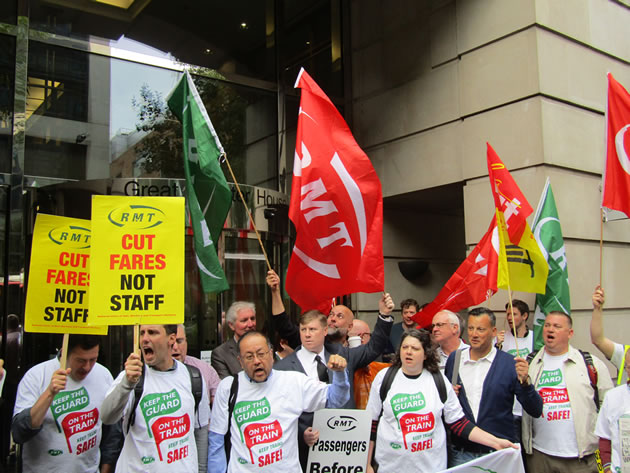Southern Rail Strike Called Off For Final Two Days
Services will not return to normal this week despite end of industrial action

RMT members demonstrate outside the Department of Transport
The strike on the Southern rail network has been called off for the last two of the five days it was due to run. New talks about the role of conductors are to take place.
Despite the cancellation of industrial action Southern say that a 'strike timetable' will continue to operate on Thursday 11 August. This means that up to 40% of scheduled trains will not be running. Southern say they are working with Network Rail to introduce trains on additional routes and operate extended hours where possible.
On Friday 12 August they say they aree doing everything they can to operate a service as close as possible to the pre-strike timetable (the revised timetable in operation last week) however as they restore trains and train crew to their normal pattern of working, there may be short notice delays, cancellations and alterations.
The revised timetables are not on journey planners so if you are intending to travel this weke you are advised to check Southern's live information page first.
RMT members began a five-day walk out on Monday but Southern said it was encouraged by the acceptance of its offer of talks.
The RMT had earlier said that it would suspend strike action on Southern rail if the company agreed to new talks without pre-conditions.
Southern had said it will not talk with the RMT unless the union is willing to discuss an eight point plan it rejected at the end of last week.
The RMT announced its five days of industrial action by conducters across Govia Thameslink Railways, which includes the Southern rail network, last month.
Parent company Govia Thameslink wants to introduce trains with driver operated doors using CCTV, but the union fears job losses and has raised safety concerns.
The union is also objecting to the creation of ‘Station Hosts’ which will operate across the network should ticket offices close. They claim that staff will be forced onto flexible working with an increased workload without the prospect of reasonable compensation.
August 11, 2016
